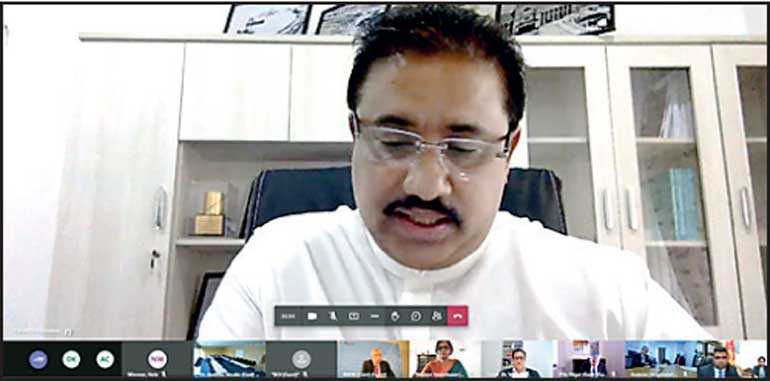Friday Feb 20, 2026
Friday Feb 20, 2026
Friday, 23 April 2021 00:00 - - {{hitsCtrl.values.hits}}

 A webinar on ‘German Sri Lankan Economic Relations: Maritime Industry and Digitalisation Trends,’ jointly organised by the Embassy of Sri Lanka in Germany, the German Chambers of Commerce and Industry (DIHK) and the Delegation of German Industry and Commerce (AHK) in Sri Lanka was held on 25 March.
A webinar on ‘German Sri Lankan Economic Relations: Maritime Industry and Digitalisation Trends,’ jointly organised by the Embassy of Sri Lanka in Germany, the German Chambers of Commerce and Industry (DIHK) and the Delegation of German Industry and Commerce (AHK) in Sri Lanka was held on 25 March.
The webinar was organised with a view to sharing the vision and strategy of the Government of Sri Lanka in transitioning to a maritime hub, highlight new investment opportunities and to further foster bilateral relations. Over 70 representatives of shipping, freight-forwarding and logistics companies from Germany and Sri Lanka participated at the webinar, which was moderated by Andreas Hergenroether, Chief Delegate of AHK in Sri Lanka.
A distinguished panel of speakers including Minister of Ports and Shipping Rohitha Abeygunawardena, Parliamentary State Secretary of the German Federal Ministry of Transport and Digital Infrastructure and Federal Government Coordinator for Freight Transport and Logistics Steffen Bilger, Federal Government Coordinator for the Maritime Industry Norbert Brackmann and the Foreign Secretary of Sri Lanka Admiral Prof. Jayanath Colombage addressed the participants on ‘Opportunities of cooperation in the field of maritime affairs’.
Minister Abeygunawardena elaborated on the plans of the Government of Sri Lanka in enhancing the capacities of Colombo and Hambantota ports, whilst focusing on digitalisation of the operation processes. Parliamentary State Secretary Bilger, who is no stranger to Sri Lanka, spoke of the prominence given by the Federal Government of Germany to the Indo Pacific region under the recently published Indo Pacific Guidelines and reiterated Germany’s interest to strengthen collaboration with Sri Lanka in the maritime sector.
Ambassador of Sri Lanka in Germany Manori Unambuwe highlighted that the development of economic corridors integrating ports and airports, was a key focus of the Government’s policies and invited German companies to explore new investment opportunities that are in the pipeline.
Chief Executive of Foreign Trade and Member of the Executive Board, Association of German Chambers of Commerce and Industry (DIHK) Dr. Volker Treier in his opening remarks pointed out the close economic relations between Germany and Sri Lanka. Bilateral trade in 2020 amounted to EUR 950 million. The interest in the event shows the economic potential especially in the maritime sector.
Addressing the participants, Foreign Secretary Admiral Prof. Jayanath Colombage underlined that Sri Lanka, being strategically located, face numerous challenges in the maritime sector and highlighted the importance of the nation’s transition to a fully-fledged maritime hub, from its current position of a trans-shipment hub.
Federal Government Coordinator for the Maritime Industry Norbert Brackmann stated that Sri Lanka has a geo strategic position in the Indo-Pacific region and is therefore a key player in the tremendous economic development and societal change Asia is seeing. Germany has adopted its Indo Pacific Guidelines in September 2020, marking a strategic approach and positioning itself as a neutral international trading partner, committed to rule based, transparent and sustainable partnership with Sri Lanka. Also, he expressed the firm partnership between German companies and Sri Lanka. The German Government supports those companies doing business abroad through its instruments designed to promote foreign trade and investment.
Sri Lanka Ports Authority Chairman General (Retd) Daya Ratnayake shared the plans to develop the ports and its ecosystem, and spoke of the digitalisation of port operations spurred on by the COVID-19 pandemic. Managing Director and Partner of HPC Hamburg Port Consulting of Germany Dr. Felix Kasiske shared the value gained by digitalisation and the seamless integration of all stakeholders in the port community.
Board of Investment of Sri Lanka Chairman Sanjaya Mohottala made a presentation on the ‘Investment Opportunities in Sri Lanka,’ which was followed by a lively Q&A.